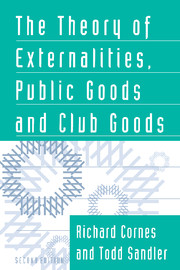Book contents
- Frontmatter
- Contents
- List of tables and figures
- Preface
- Part I Introduction to the theory of externalities, public goods, and club goods
- Part II Externalities
- Part III Public goods
- Part IV Clubs and club goods
- Part V Applications and future directions
- 17 Empirical estimation and public goods
- 18 Applications and empirics
- 19 Conclusions and directions for future research
- References
- Author index
- Subject index
18 - Applications and empirics
Published online by Cambridge University Press: 05 June 2012
- Frontmatter
- Contents
- List of tables and figures
- Preface
- Part I Introduction to the theory of externalities, public goods, and club goods
- Part II Externalities
- Part III Public goods
- Part IV Clubs and club goods
- Part V Applications and future directions
- 17 Empirical estimation and public goods
- 18 Applications and empirics
- 19 Conclusions and directions for future research
- References
- Author index
- Subject index
Summary
In Chapter 17 we investigated some empirical estimations of the demand for public goods, based on the median-voter model and the oligarchy choice framework. Means for discriminating between models were also reviewed. This chapter takes up other evaluation methods for estimating the demand for public goods, including direct and indirect methods. Direct methods include contingent valuation and experimental approaches, whereas indirect procedures encompass hedonic valuation and travel-cost methods. In addition to discussing these evaluation methods, this chapter presents some applied theoretical analyses that concern club theory, joint products, and the voluntary provision of public goods. So many applied studies have appeared in the past three decades that our presentation is necessarily eclectic. A comprehensive survey could easily fill one or more volumes. Our intent is to convince the reader that the theories developed in Chapters 1 – 16 are useful for understanding economic phenomena in the real world and deriving policy conclusions. When evaluation techniques yield outcomes at odds with the theory, the theory must be reexamined and possibly replaced with a more predictive theory. At several points, we refer to recent surveys that can direct the reader to studies in greater depth and additional references for specific topics.
The remainder of this chapter consists of five sections. Section 18.1 reviews direct evaluation techniques, and Section 18.2 presents indirect evaluation methods. In Section 18.3, applications of club theory include public utilities, recreation goods, multiproduct clubs, highways, and alliances.
- Type
- Chapter
- Information
- The Theory of Externalities, Public Goods, and Club Goods , pp. 506 - 535Publisher: Cambridge University PressPrint publication year: 1996



